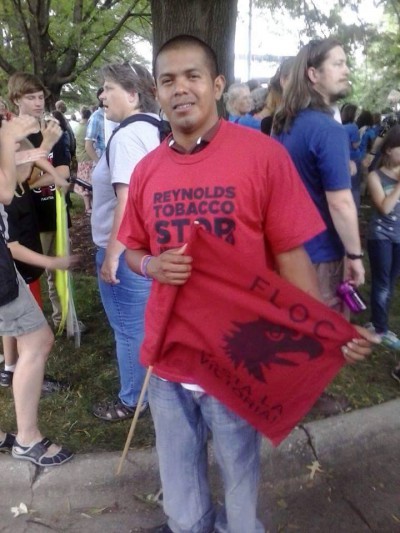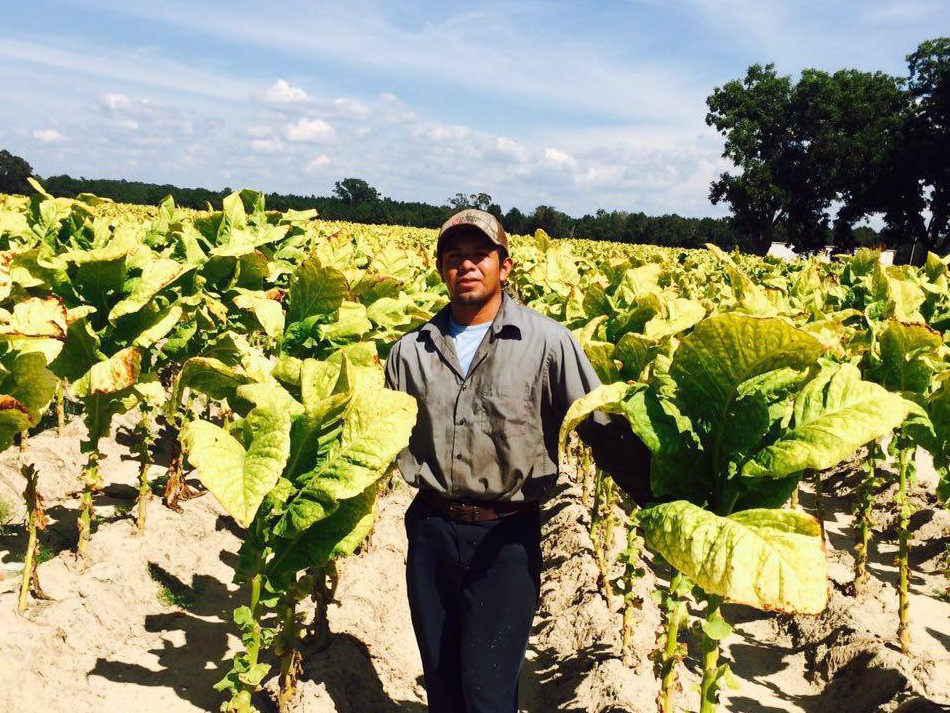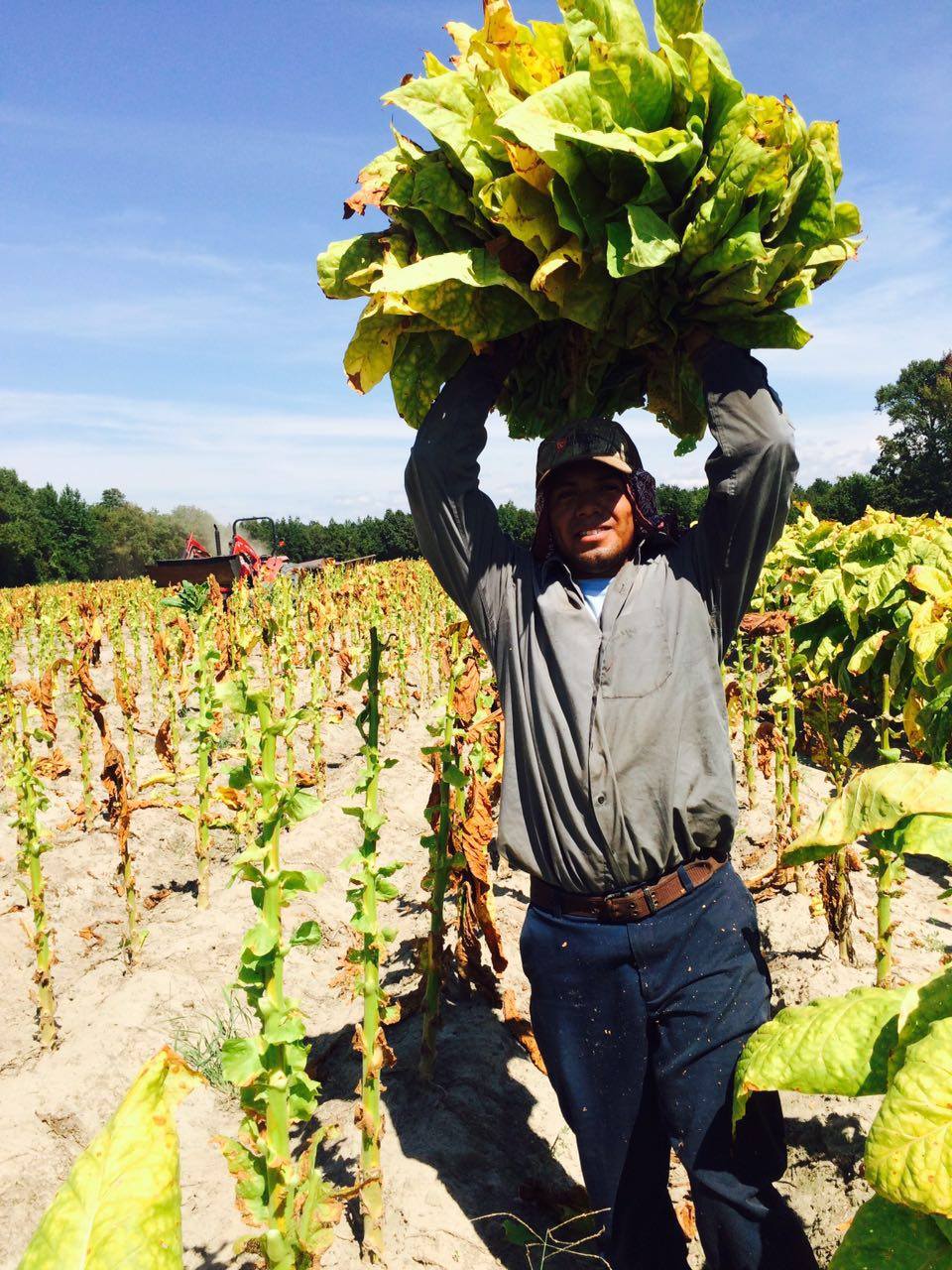Abel is sharing his story as part of our “Voces: Somos FLOC/ Voices: We Are FLOC” campaign to highlight stories from our members to raise funds and build awareness to support the important organizing work our members are doing in the fields. Please consider making a donation today to support this campaign.
Lea la historia de Abel aquí en Español.
As Abel turns 30 this month, he’s thinking about how much of his life he’s spent working in the fields. Every year for the past eight years, he has traveled to North Carolina from his home in Tamazunchale, Mexico to work in the fields for anywhere from four to six months. The work has taken its toll on him physically, but he says the hardest part is feeling like he has lost a part of his life that he could have spent at home with his family. “This work is very hard, and you suffer a lot. Sometimes I think, what kind of life is this? We are alone in the camps, away from our families, missing our kids.”
At 18, when Abel graduated from “preparatoria”, or high school, he went to Monterrey to work at H-E-B, a chain store similar to WalMart. His goal was to save up enough money to get a passport, so he could come to the US to work. “There are no jobs in Tamazunchale,” says Abel. “I had to find another place to make money.” His father, a FLOC member who had been working seasonally in North Carolina since 2004, worked with FLOC to help Abel through the recruitment process, and in 2008 Abel made his first cross-border trip to North Carolina.
In August of that year he arrived at a farm in Henderson, NC, where he and eight coworkers were in charge of harvesting all of the grower’s tobacco by hand. Abel felt nervous because he had never worked in tobacco before, and he relied on his coworkers to show him how to carefully and quickly pick the correct leaves, one row at a time. But by the third day in the fields, Abel knew something was wrong. “When we left the field that day, my whole body felt terrible. I was dizzy and nauseous. I asked my coworkers what was happening to me, and they said it was from the nicotine in the tobacco. They told me it was normal, every new tobacco worker goes through it.”
The next morning he took anti-nausea medicine before he went to work, but his symptoms only got worse. By 7:00pm when they finally finished work and went back to the camp, Abel says he felt like the world was spinning around him. He tried to shower and drink milk, which some farmworkers say helps with nicotine poisoning, but nothing helped. “I was vomiting so hard that my whole body lost strength. I was scared, and I started to cry because I didn’t know what was happening. I thought I might die. I called my dad, who was working on a different farm, and he told me it would be ok, that this was all normal.”
With time, Abel says his body got used to the nicotine and he didn’t feel the effects as much as the first week. After a traumatic first experience in the fields, he was afraid to return again the following season. But without a young daughter to support and no job opportunities in his home town, he says his only option was to travel to the US and try to make as much money as possible during the season. “I decided that what doesn’t kill me will make me stronger,” he says.
And it certainly has made him stronger. During his third season in North Carolina, Abel joined the union, and found it was a source of strength and support to get through the season. “When I joined I felt like I had someone supporting me, like I wasn’t so alone,” he remembers. “I saw the union fighting for everyone who works in the fields. And I saw Americans supporting us, too. Even though they don’t do this work, they were supporting our fight, and when we have problems they are there to support us.”
Abel began to attend union meetings and trainings, and now he teaches others about the benefits of having a union contract. “For me, it’s about job security,” he says. “I know that if my grower doesn’t request me again next year, I can submit a bid through the union. Without a union, if your grower doesn’t request you, you could have to wait or lose a season of work.” He says the contract also offers protection in case you are injured at work. “Without the union and an attorney, a grower could just send you back to Mexico if he doesn’t want to help you.”
 Abel gets more involved with the union each year, and he’s always thinking about ways to negotiate more benefits for members. “If you compare field work to other jobs, many other jobs are easier and better paid. This work kills us every day in the fields. We suffer from illnesses, some have died. We give everything in the fields, and in the end we have very little. We deserve better wages, and someday I’d like to negotiate a pension, so that we have something for later in life.”
Abel gets more involved with the union each year, and he’s always thinking about ways to negotiate more benefits for members. “If you compare field work to other jobs, many other jobs are easier and better paid. This work kills us every day in the fields. We suffer from illnesses, some have died. We give everything in the fields, and in the end we have very little. We deserve better wages, and someday I’d like to negotiate a pension, so that we have something for later in life.”
Another interesting thing about Abel: he can rap. “I like music with a message,” he says. He uses his skills to write raps about things he has been through in life, and also about the union. Listen to one of Abel’s latest raps about FLOC here (in Spanish).
Abel is slowly working toward his goal of one day not having to return to the US to work. He is building a house in Mexico, and each year when he finishes a season in North Carolina, he is able to build a little more of his house. “Eventually, I’d like to be able to stay in Mexico with my family, and have my own house. I want my daughter to be able to finish school, and someday I’d like to start my own business.”
But while he’s here each year, Abel is determined to see the union flourish and be a part of improving conditions for all farmworkers. “FLOC is part of my life. I’m so grateful. And I am with the union until the end.”


